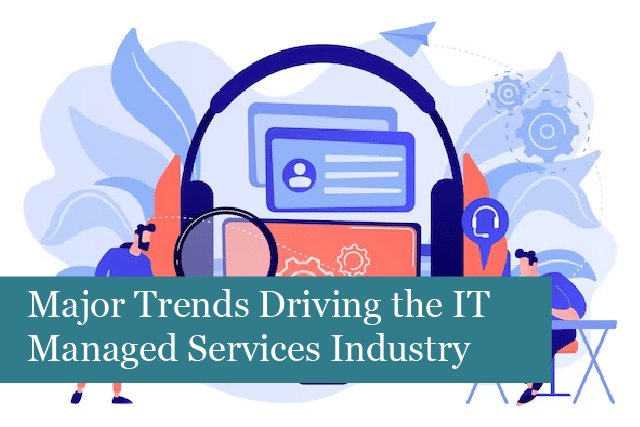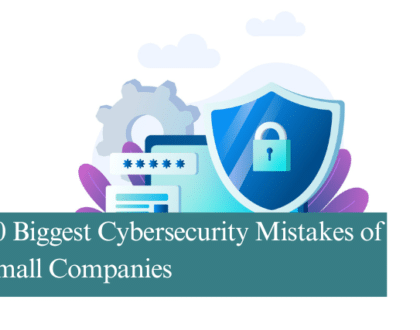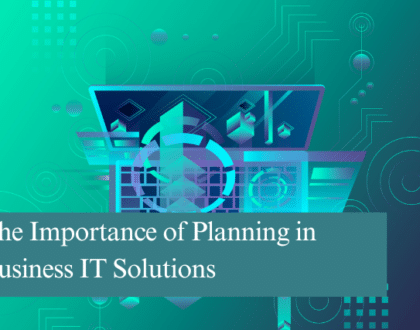
When it comes to the IT managed services industry, there are always new technologies to consider. This is an industry that makes staying current challenging, yet staying up to date is essential for all companies. The ability to leverage new technology and tools ensures your business is able to operate effectively while minimising cyber threats and staying competitive.
However, managing to stay current can be overwhelming for SMBs who may not have their own in-house IT teams. This is where managed IT service providers are valuable; they provide tasks essential for maintaining and monitoring IT systems, including servers, networks, workstations, and more. Professional managed IT service providers stay current with new technologies so small and medium businesses don’t have to.
In this article, we’ll take a look at some of the latest trends in managed IT services, including how tech such as AI and automation are being used, the continuing importance of cybersecurity, and more.
The Shift to Remote & Hybrid Workplaces
Remote working and hybrid work arrangements continue to be important for many businesses. Some have estimated that up to a third of employees will work remotely or work hybrid by the end of this year. IT infrastructure will need to become more flexible and scalable than ever before, accommodating in-person and remote work.
Managed service providers will also need to adopt new service delivery models that make it easier for them to support remote workers, such as virtual help desks, remote monitoring, management tools, remote access solutions, and more. MSPs will also need to make sure that their clients’ IT infrastructure and data are secure and compliant with industry regulations, no matter where employees work.
Cybersecurity Continues to Be Important
Next on our list of the latest IT trends in cybersecurity. Cyber threats continue to be a major problem, with criminals continuously developing new ways to attack and hack company data. Hackers’ tools and techniques are becoming more sophisticated. IT managed service providers stay current with all threats and security tools to keep their clients safe while lowering their cybersecurity threats.
MSPs can provide the following cybersecurity services:
- Consulting services: help clients develop cybersecurity policies and strategies
- Performance of risk assessments: to find vulnerabilities and develop plans to tackle these issues
- 24/7 security monitoring: MSPs also monitor client IT infrastructure, which includes network devices, servers, endpoints, and more.
- Threat detection & response: these services quickly identify and respond to security incidents and minimise their impact while preventing additional damage.
Demand for Omnichannel Support
Many clients expect managed IT service providers to offer omnichannel support. Omnichannel support refers to providing seamless support across multiple channels, including email, social media, chat, phone, and more. This makes it easier for customers to reach out to businesses on channels they prefer. And they can receive seamless support for each channel a client uses.
Omnichannel environments need data that’s allowed to flow between applications and systems and make it easier to respond to questions and handle analytical insights. That’s a tall order for any managed IT service provider. However, partnering with the right MSP ensures that organisations can easily connect and build an IT environment that fits their omnichannel services.
Growing Need for Cloud-Based Services
Another trend in managed IT services is the growing need for cloud-based services. Cloud-based services continue to be essential for businesses of all sizes. Companies have realised they can quickly scale their IT infrastructure up or down as needed without investing in expensive hardware and software.
Managed service providers are making the transition easier for their clients by including cloud services as part of their offerings and assisting with cloud migrations. They can also provide managed IT support for cloud applications and help with security/compliance management.
AI & Automation
With the advances in AI (Artificial Intelligence) and automation, these solutions make it easier for MSPs to monitor systems and automate recurring, routine tasks. AI also makes it easier for service providers to proactively monitor for problems by detecting possible issues and preventing them from becoming full technical problems that can stop company operations.
For example, AI can analyse data from IT systems and predict when hardware or software components are more likely to fail. This allows MSPs to perform maintenance tasks before failure takes place, reducing downtime and improving system performance.
The Benefits of Managed IT Services
Managed IT service providers offer a broad range of services for businesses. They are a worthwhile investment when it comes to business operations. But why? What makes managed IT service providers such a benefit?
Cost-Effective Solutions
One of the main benefits of working with an MSP is that they offer a cost-effective IT solution. There’s no question that an in-house IT department can be expensive. On the other hand, a managed ISP service provider brings an entire team of IT experts to bear on a company’s IT requirements.
They cost only a fraction of the cost of hiring and paying an IT department. Managed service providers also offer predictable monthly billing, which makes it much easier to budget for IT services, and more.
Scalability
Managed service providers also provide a company with the capability to scale their infrastructure up or down as needed. When working with an MSP, a business can easily add or remove users, increase/decrease storage capacity, upgrade software and hardware, and more. Managed service providers offer flexible services that are able to meet the changing tech requirements facing most businesses.
Access to the Latest Technology
Another benefit of hiring a managed service provider is that they can give a company access to the latest tech. They can invest in the latest technology and ensure their clients have access to the best and latest tools available. Businesses can now access the latest technology without making major investments into expensive hardware and software.
Summing It Up
Managed IT service providers are valuable partners and assets for businesses of all sizes. They stay up with current tech trends and ensure businesses save money, increase productivity & scalability, as well as have the freedom to focus on their core competencies.
Now is the right time to consider working with a managed IT services provider!
Recommended Posts

How to Get the Most Out of Your IT Budget
25th April 2025

10 Biggest Cybersecurity Mistakes of Small Companies
18th April 2025

The Importance of Planning in Business IT Solutions
11th April 2025
